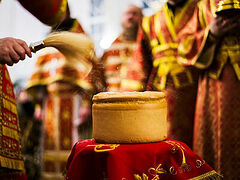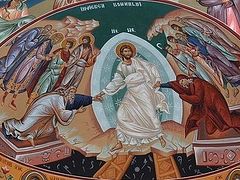Christ is Risen!
Having fed us with all abundance throughout this present week with the immaterial bread of the word of God and sweet hymns, the Holy Church, out of condescension to our weakness, has gathered us now also to break the material bread for us.1 But just as the world is accustomed to degrading the most spiritual things to flesh and blood, so the Church elevates the most sensual things to the spiritual. It’s not in vain that images of sacred objects can be seen on this fragmented bread: This directs the most spiritually near-sighted to its spiritual meaning and understanding.
Why is this bread being broken now? The holy bread is being broken now, according to the clear instructions of the Church read in the prayer at its consecration, in memory of the Resurrection of Christ. Why is bread connected with the memory of the Resurrection when there was not and could not have been any kind of bread at the Resurrection itself? There are many reasons.
Firstly, the Old Testament Jewish Passover, established during the exodus of the Israelites from Egypt and serving as a prefiguration of our Pascha, was connected with seven days of eating special, sacred unleavened bread. It was necessary to remind Christians too, amidst Pascha, of this eating, which was highly instructive for the Israelites. All the more blessed now is this bread in memory of the Resurrection of Christ, because in the stories of the Evangelists, there are many instances when we see the Risen Christ either partaking of or blessing food. Thus, in the evening of the very day on which He resurrected, He breaks bread in Emmaus and is recognized in this breaking by two of His disciples who hadn’t recognized Him the whole time they were walking with Him. On the evening of the same day, in Jerusalem, among His Disciples, the Lord Himself deigns to eat fish and honey as proof that they behold before them not a ghost, but their true Teacher, truly risen from the dead. Then in Galilee, by the Sea of Tiberias, the Risen Lord prepares an entire wonderful meal for His Disciples who are tired from fishing in vain all night, and at this meal He thrice amicably torments Peter’s love with the question, Lovest thou Me?
So many events are recalled by this holy bread that we now break. So many mysteries in it! So many prayers read over it! So many blessings in it!
So, Christian, in eating this bread, bring to mind, first of all, the exodus of the Israelites from Egypt, and see where you yourself are—have you not been in Egypt? Are you not working for Pharaoh, the god of this age? Where the Spirit of the Lord is, there is liberty (2 Cor. 3:17). If you don’t have this Spirit in you, then you’re a slave to the passions. If the Son of God doesn’t liberate you from the bondage of sin, then you will remain a slave forever. Turn to Him with the desire to do His will. Begin to smite, with the help of God, the enemies of your salvation, as with ten strikes—the fulfillment of the Ten Commandments. When the last of them: Thou shalt not covet (Ex. 20:17), strikes the very firstborn of Egypt—impure thoughts and desires, then the bonds of sin that oppress you will be resolved by themselves, and you will go out into the freedom of the Spirit. But having gone into the desert of self-denial, don’t turn your face to Egypt; suppress, if it appears, the hunger for Egyptian meat—carnal pleasures. You’ve had enough of angelic bread, manna from Heaven—those pleasures of the spirit with which the Lord feeds His faithful servants. Otherwise, the graves of those who lusted (Num. 11:34) for quails (Ex. 16:13)—earthly and spiritual joys—may be erected on the borders of the heavenly Canaan.
From the Jewish Passover, O Christian, turn in your thoughts to the Christian Pascha when eating bread now—think about why and how the bread was eaten or blessed by the Risen Lord, and learn yourself to eat it this way.
Two of Jesus’ Disciples didn’t recognize their Lord the whole time with Him. Doesn’t the same thing happen with us, beloved, on the path of our lives? It can’t be that Jesus wasn’t with every one of us on this path, for He promised to be with those who believe in Him at all times. But will He be known to all of us as He should be? Do we recognize our Lord and Savior in Him? Have we been completely convinced that there is none other name either in Heaven or on earth by which we might be saved other than the name of Jesus (Acts 4:12)? That without Him every man is an enemy of God, is a dead branch, fit only for burning? And the days of your life, beloved brother, are already coming to an end. It would be bad to reach the sunset of your life without the Heavenly Companion. It’s fearful to pass through this mortal canopy alone—without the Savior! Make haste to know Him, at least in the breaking of bread—according to those sensible signs in which He was pleased to manifest His presence in His Church. Try to partake more often of the Lord’s Table, which is offered to all believers: The abundance of Christ’s love revealed in it will warm your cold heart, and you begin little by little, partaking of it, to know how good the Lord is (Ps. 33:9), and that the Lord is near to all that call upon Him … in truth (Ps. 144:18).
Before the Disciples, in Jerusalem, the Lord eats food to prove that they see before them not a phantasm, but the actual body of their Teacher. And as you look, beloved—is not your whole faith a phantasm? Does it not consist of some idle concepts, having no influence on your life? Do you not confine yourself to one form of piety, not concerned about its power, about appearing not only honorable before men, but also to be that way in fact before God, in your conscience? The sign and proof of true Christianity is not contemplation and an abundance of knowledge, not much talking and questioning, not the purification of external dishes and vessels, but taking down the old man with its passions and lusts, rebirth in the spirit, walking in the image of Christ and the inner cross. If you have all of this in you, then Christ is truly Risen in you, and you can indulge in all the joy of His Resurrection: Otherwise, you still need Peter’s tears and the publican’s contrition.
There is much to learn from the supper on the shore of the Sea of Tiberias. The preeminent of the Apostles unsuccessfully labored all night at catching fish, until the Savior Himself suddenly appeared and ordered them to again cast down their nets. And don’t think, whoever you are, of having success in spiritual perfection without the blessing of God. You can acquire all the benefits of the world, but without Him, you can’t acquire that precious pearl (Mt. 13:46) that’s more valuable than the entire world. You can adorn yourself with several virtues, with which many pagans adorned themselves, but there’s no way you can change your evil heart, pluck the root of sin from it. This is beyond your strength, beyond the strength of all the angels—this is His work, and His alone. Turn to Him for this, pray to Him for this. When He closes the fountains of the deep (Gen. 8:2) in you—the abysses of natural evil—then nothing will open them. When He opens the fountain of goodness in you—love for God and man—then no power of hell can shut it up: It will flow into eternal life.
But do you hear, beloved brother, the question being asked at the supper at Tiberias? Lovest thou Me? the Lord says. If Peter, who changed once, heard this question three times, then how many times should He ask us? Let us not be in a hurry, however, to answer this with the tongue of Peter; let us first have the heart of Peter: It requires not words, but deeds. If a man love Me, says the questioner Himself, he will keep My words (Jn. 14:23). This is a sign of love! Do you have it? It’s good for you if you have it, for in that case, you can see the Lord and sup with Him, even before death. If a man love Me, He says, he will keep My words: and My Father will love him, and We will come unto him, and make Our abode with him (Jn. 14:23).
Thus, remembering all these Gospel suppers at the present eating of this holy bread, is it possible, brethren, to forget that blessed supper which, although it wasn’t established by the risen Savior, and couldn’t have been established on earth, was nevertheless promised by Him to all His followers in the Heavenly Kingdom? (Mt. 26:29). And remembering the supper that awaits us in this Kingdom, should we not recall the wedding garments that everyone will need there? Terrible is the fate of a servant who is cast out into the outer darkness for not having this garment! Let us hasten, brethren, to acquire this precious garment of good works in advance, and to cover and adorn it in advance with the merits of Christ, so that, at the first call, we might be ready for the marriage of the Lamb. Let us make haste: For neither on earth nor in Heaven are the Royal Gates always open. There will be a time when they will be closed forever, and those rushing through them will hear: I know you not (Mt. 25:12).
Amen.




